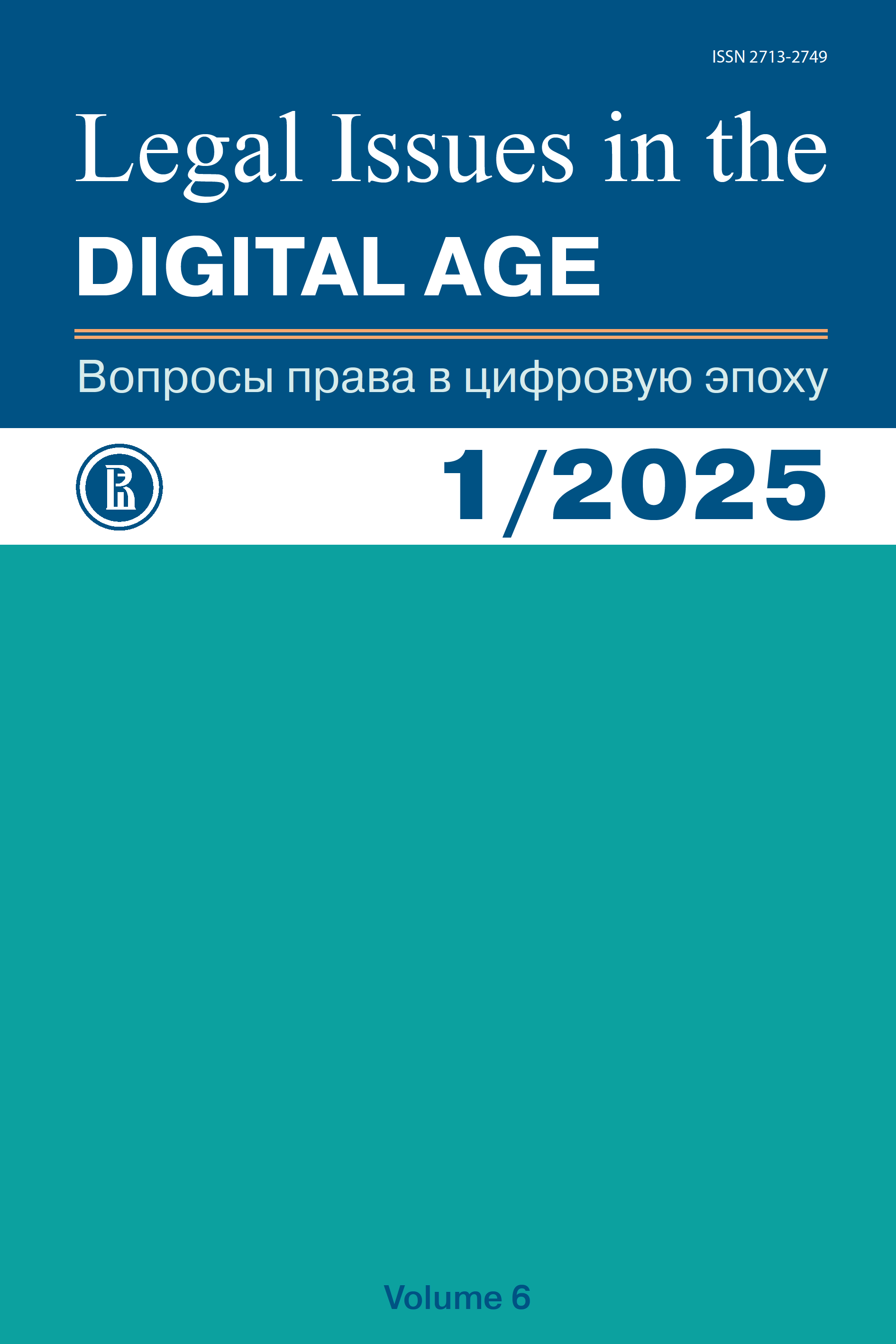Model Regulation of Artificial Intelligence and other Advanced Technologies
Abstract
The article provides a discussion of legal regulation of social relations by the Interparliamentary Assembly of the CIS Member States with regard to AI and other advanced information technologies, identifiable regulatory gaps, conceptual framework, analysis of possible use scenarios and related risks, as well as the range of problems to be addressed by regulation on a priority basis. It contains a brief overview of how AI-related social relations are regulated in the CIS member states. While all these countries admit the importance of such regulation, none has developed a clear understanding of a number of issues, only to stress the relevance of developing a draft model law on AI technologies. The authors demonstrate the following common problems of regulating these relations in the CIS member states: identifying the regulatory scope and the parties concerned and, importantly, addressing the issues of liability including what party (AI technology rights holder, developer, system operator etc.) and in what case will assume a particular type of liability (administrative, civil, financial, criminal). Another important aspect is also discussed — digitization and advanced digital technologies shaping “new” digital personal rights — with an analysis and brief overview being provided. The study purports to identify the trend and opportunities for public regulation of AI and other advanced digital applications. With this in mind, the authors discuss possible regulatory vectors in the given area in light of the risks related to operational specifics of digital technologies, and identify groups of social relations to be adequately addressed by legal regulation. With digitization covering an ever wider range of social relations, the problems to be addressed by law include the protection of personal rights as well as prevention of non-discrimination of individuals and economic agents. The article employs a number of scientific methods of inquiry, general and special research methods including the formal law method. The general research methods include systemic, dialectic, structural systemic, analytical/synthetic, inductive and deductive methods, abstraction, simulation. The article concludes that, while the CIS countries are at different regulatory stages in the discussed area, there is no comprehensive regulation, with only individual provisions and regulations in place to govern specific aspects of AI use. A model law, once developed, will allow to lay the ground for comprehensive regulation of the discussed relations by the national legislation.
References
Amelin R.V., Chennov C.E. (2023) The Evolution of Law under Influence of Digital Technologies. Moscow: Norma, 280 p. (in Russ.)
Avdeev R.A. (2023) The Right to Abandon Using Digital Technologies in Private Life. Grazhdanskoye obschestvo v Rossii i za rubezhom=Civil Society in Russia and Abroad, no. 4, pp. 18–20 (in Russ.)
Fedotov M.A., Naumov V.B. et al. (2024) The Right to Refuse Technologies: the Results of Expert Poll. Trudy po intellectualnoi sobstvennosti=Works on Intellectual Property, vol. 48, no. 1, pp. 8–28 (in Russ.)
Global Atlas of Artificial Intelligence Regulation. Ed. by Neznamov V. (2023) Consultant Plus
Golovanov N.M. (2022) The Legal Personality of Artificial Intelligence. Teoria prava i mezhgosudarstvennykh otnoshenyi=Theory of Law and Interstate Relations, vol. 1, no. 9, pp. 24–25 (in Russ.)
Ibragimov R.S., Suragina E.D. et al. (2021) Ethics and Regulating Artificial Intelligence. Zakon=Statute, no. 8, pp. 85–95 (in Russ.) DOI: https://doi.org/10.37239/0869-4400-2021-16-8-85-95
Ivliev G.P., Egorova M.A. (2022) Legal Aspects of Status of Artificial Intelligence and Products Made with its Participation. Zhurnal rossiyskogo prava=Journal of the Russian Law, no. 6, pp. 32–46 (in Russ.)
Khabrieva T.Ya. (2009) The Legal Dimension of a Scientific Progress. Zhurnal rossiyskogo prava= Journal of the Russian Law, no. 8, pp. 14–24 (in Russ.)
Khabrieva T.Ya., Chernogor N.N. (2018) The Law in Conditions of the Digital Reality. Zhurnal rossyiskogo prava=Journal of the Russian Law, no.1, p. 88 (in Russ.)
Khisamova Z.I., Begishev I.R. (2020) The Substance of Artificial Intelligence and the Issue of its Legal Personality. Vestnik Moskovskogo gosudarstvennogo oblastnogo universiteta. Yurisprudencia=Bulletin of the Moscow Regional University. Juriprudence, no. 2, pp. 100–103 (in Russ.)
Klochkova T.N., Pimenova O.V. (2024) Artificial Intellect: Dangers and Security. Bezopasnost biznesa=Security of Business, no. 4, pp. 49–52 (in Russ.)
Minbaleev A.V. (2018) Issues of the Artificial Intelligence Regulation. Vestnik Yuzhno-Uralskogo gosudarstvennogo universiteta. Pravo=Bulletin of the Southern Ural State University. Law, no. 4, pp. 82–87 (in Russ.) DOI: https://doi.org/10.14529/law180414
Naumov V.B. (2024) The Right for Abandoning Digital Technologies in the Sphere of Artificial Intelligence. Vestnik gosudarsnvennogo yuridicheskogo universiteta Kutafina=Bulletin of the Kutafin Law University, no. 10, pp. 26–36 (in Russ.) DOI: https://doi.org/10.17803/2311-5998.2024.122.10.026-036
Novikov D.A. (2024) Recognition of Legal Personality of Artificial Intelligence and Liability for its Decision-Making Abroad. Trudovoe pravo v Rossii i za rubezhom=Labor Law in Russia and Abroad, no. 2, pp. 19–22 (in Russ.) DOI: https://doi.org/10.18572/2221-3295-2024-2-19-22
Sharnina L.A. (2023) Normative Legal Regulation of Digitalization: Constitutional Dimension. Konstitutcionnoe i municipalnoe pravo=Constitutional and Municipal Law, no. 2, pp. 22–27 (in Russ.)
Copyright (c) 2025 Tereschenko L.K., Tokolov A.V.

This work is licensed under a Creative Commons Attribution-ShareAlike 4.0 International License.
Authors who publish with this journal agree to the Licensing, Copyright, Open Access and Repository Policy.










